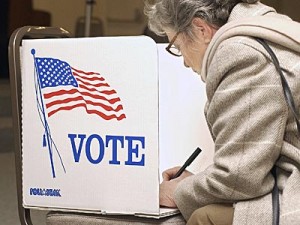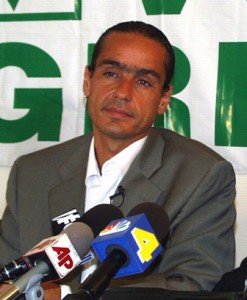by Michael Feinstein
Fox and Hounds
Monday, January 23rd, 2012
 A bill about to be passed by the Legislature – AB 1413 – would rob us of our right to vote for write-in candidates, a right we’ve enjoyed and exercised since California statehood in 1850.
A bill about to be passed by the Legislature – AB 1413 – would rob us of our right to vote for write-in candidates, a right we’ve enjoyed and exercised since California statehood in 1850.
With such a major change, one would assume it’s imminent passage is the culmination of a long public process, where the proposed change has been publicly vetted, with broad participation by civic and good government groups in debates, public forums, op/eds and talk shows.
But AB1413 hasn’t gone through such a process. Instead it’s come through the back door in a “gut and amend” bill, gutted a few days before the end of the August 2011 legislative session and now back for a quick ’emergency’ 2/3 vote so it can go into effect immediately.
AB1413 is being pushed hard by the County Clerks, because it addresses ballot-printing requirements they believe could create an unnecessary burden and significantly increase election costs. Great, let’s address this. But there is no reason to mix such a technical fix with such a profound voting rights issue.
Where is this coming from?
There are currently both state and federal lawsuits challenging Senate Bill 6 (SB6); a federal appeals court will soon hear the federal lawsuit (Chamness v. Bowen). SB6 was the implementing statute for Proposition 14, which created the jungle primary/top two general election process for California and is slated to be tried for the first time this year.
The authors of Proposition 14 specifically avoided putting the write-in question on the ballot before the people, by hiding it in SB6. What SB6 says is that even though voters’ ballots include a space to cast write-ins, such votes won’t be counted! This violates our state constitution, which guarantees the right for everyone to have his or her vote counted. This is one of the main points of both lawsuits.
But instead of eliminating the portion of SB6 that deprives us of our ability to cast write-in votes and thus protecting our right to have our votes counted, AB1413 would get rid of the ability to cast write-ins entirely — and do so without meaningful public debate.
This dark way of doing politics is exactly how we got Proposition 14 in the first place. Proposition 14 was placed on the ballot (and SB6 approved by the legislature at the same time) between 3:40 am and 6:55 am, in February 2009 – fifteen months before Proposition 14 appeared on the ballot. This was in response to political extortion by then State Senator Abel Maldonado, who named that as his price to give the legislature the final ‘yes’ vote it needed to reach 2/3 to approve that year’s eight months’ overdue state budget.
Whether one cares or not about write-in voting, good government demands that the people have a say before Sacramento makes such a radical change to our election laws. At a minimum this proposed change should’ve been introduced in a regular bill to allow for months of public hearings. More appropriately, if the legislature truly believes that Californians should lose their right to write-in voting, it should put that question before us via the initiative process and let the people decide.
But for the immediate present, with the County Clerks pushing hard for passage before the end of the month, the Assembly should amend AB1413 to ensure that voters can continue to vote for write-in candidates, and send it back amended to the Senate, which passed it in its present form last week.
Who would oppose this? One of the three listed supporters of AB1413 is the mis-named ‘Californians to Defend the Open Primary’, a San Rafael-based non-profit ‘educational’ organization funded by the same large California corporations and individual billionaire that funded Proposition 14.
Without disclosing their reasons, these “Defenders” of democracy have pushed hard for Californian’s write-in option to be taken away. Why?
Perhaps jungle primary supporters oppose write-in voting because they want to limit – not encourage – competition. One only has to look as recently as the November 2010 US Senate election in Alaska, where Lisa Murkowski was elected via write-ins after voters decided that neither the Democratic nor Republican nominees were acceptable. Such a popular outcome would’ve been forbidden under SB6. Here in California, voters elected two members to the US House and one to the US Senate via write-ins between 1930 and 1983.
By contrast, the absence of write-in votes gives the misleading appearance of public embrace for such limited options, because there is no way for voters to register their differences or dissent.
But even without the Top Two, AB1413 is still a bad idea. Californians have successfully used the write-in option for 161 years. In some cases, it’s been a democratic safety valve for voters who don’t agree with the choices before them. In others, it allows the system itself to adapt to changing issues and circumstances by allowing new candidates into our extraordinarily long election process. What if a major new issue arises during the fall that has no champion, or if a candidate falls gravely ill or is convicted of a crime days before the November election?
By ensuring our right to choose a candidate of our choice, write-in votes protect our fundamental right to vote. There has been no evidence that the presence of the write-in option is hurting our democracy. By contrast, it gives voice to voters that don’t feel they have one.
Whether to do away with write-in voting is an important choice that must be made by the voter, not the Legislature. Let’s hope Sacramento makes the right call and preserves this fundamental right of democracy.
 Michael Feinstein is a former Co-chair of the Green Party of the United States and a former Mayor and City Councilman in Santa Monica, California
Michael Feinstein is a former Co-chair of the Green Party of the United States and a former Mayor and City Councilman in Santa Monica, California
